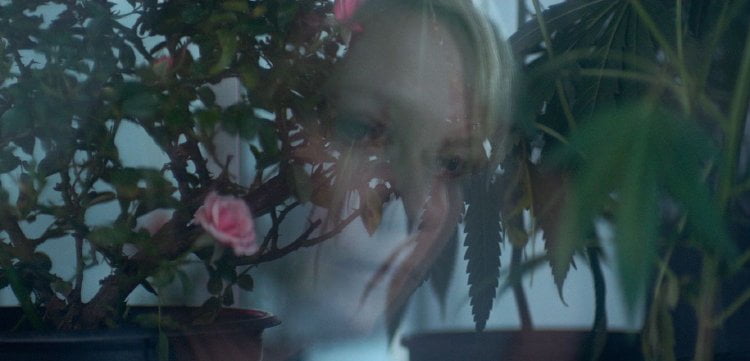Woodshock

Overcome by the death of her mother (Susan Traylor, "Greenberg"), Theresa (Kirsten Dunst) imbibes in some of the weed she treats for assisted suicide and becomes increasingly detached from reality in "Woodshock."
Laura's Review: C+
Rodarte designers Kate & Laura Mulleavy ("Black Swan's" costumers) make their feature debut with a rumination on grief in a dying world. The film begins with something resembling a conventional narrative as Theresa helps her mother leave this world with a memory of the time she was lost in the Redwood forest as a child and a treated joint she assures her will be painless. But this isn't a film for those who enjoy straightforward storytelling, instead the psychological portrait of a young woman failing to cope with loss told more with visuals than dialogue. The effect is hypnotic, complemented by Peter Raeburn’s (music department, "Under the Skin") sometimes sparing, often lush score. The Mulleavys leave us to piece together a narrative from scenes that jump across time. We see frequent shots of Theresa's husband Nick's (Joe Cole, "Green Room") workplace, a lumber mill processing the glorious redwoods she cherishes ('Do you ever regret it? Cutting everything down?' she asks). Nick wants to find their own place, but Theresa tells him her mother 'wanted them there,' the home a celebration of the outdoors with its red woods, leaf patterned curtains and botanical print wallpapers. As time progresses, Nick at first worries about his wife's whereabouts, then becomes angry as her nighttime sojourns become increasingly strange, yet his presence is rarely felt. She eventually returns to work at the medical marijuana store run by Keith (Pilou Asbæk, "A War," the film's most vibrant presence), another man concerned about her well being and one we surmise she once had a relationship with. He encourages her to accompany him to a party where 'everyone will be glad to see her,' but she spends her time on the porch only talking to Johnny (Jack Kilmer, "The Nice Guys"). At the shop, Keith tells her they have another person 'to help,' sussing out her ability to assist in the suicide of Ed (Steph DuVall), an elderly widowed customer dear to them both. She assures him that she is and we watch her prepare the pot, jar and label it. She serves Johnny at the counter, then Ed, but shortly thereafter, Keith informs her Johnny has died, demanding 'what did you do?' At home, Theresa prepares five more treated joints and begins to smoke them, one by one. Even before this point, the filmmakers leave us to fill in narrative gaps, but Theresa's journey after this point is increasingly fractured. The filmmakers use reflections, refracted light and visual overlays, Theresa frequently merged with flowers or the neon marijuana leaf from Keith's store window. She wanders among her beloved redwoods, tracing their bark, curling up in their trunks (the film's title is a reference to being lost in the woods). She frequently views Nick's birthday cake, the lone bit of nourishment residing in her refrigerator, one piece missing, the cake adorned with wildflowers. Later, she'll dump a carton of rotten eggs into her sink, a symbolic reference to death, just as she'll tear up a hand painted card received from Ed. Death comes violently for one character, although we cannot tell if it is real or imagined. The film's last scene is beautiful, narratively suggesting "Beatriz at Dinner," visually "The Witch." The Mulleavy sisters have a talent for expressing the sensual and "Woodshock" never bores, yet it's never wholly satisfying either, its trippy logic too opaque. It is a very personal film, so much so that its audience will be limited. Grade:
Robin's Review: DNS
DNS

